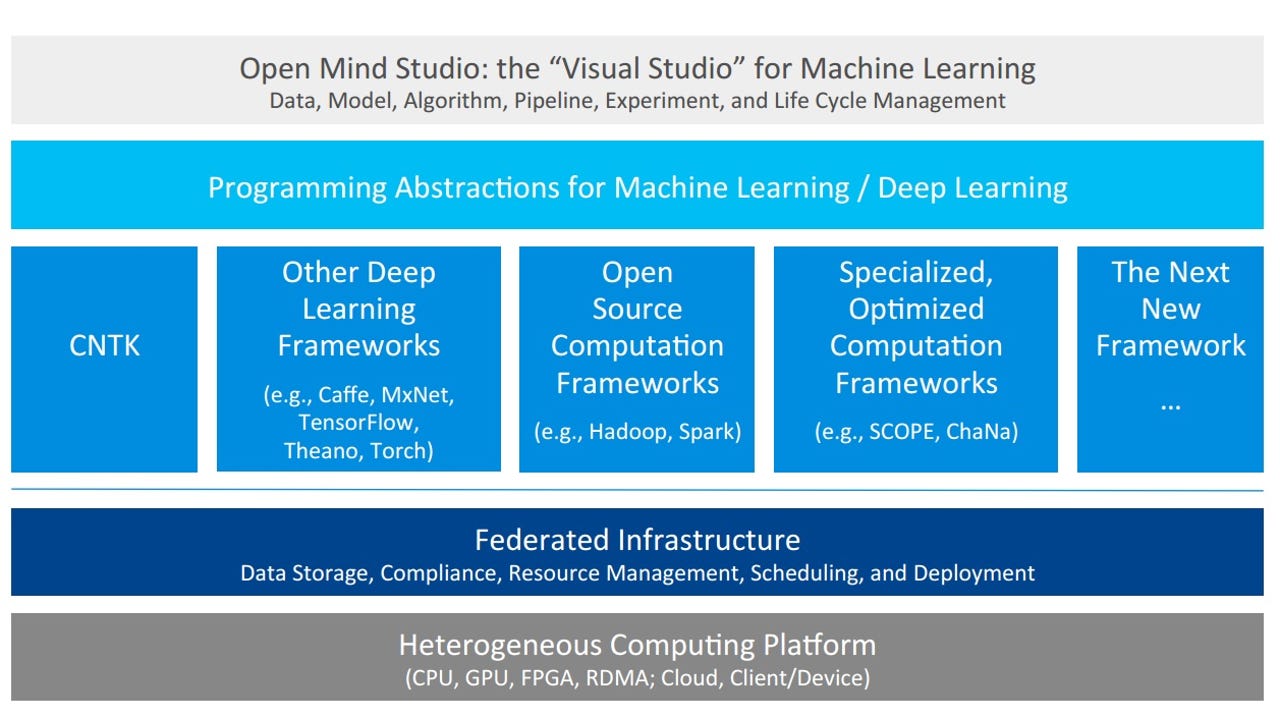Open Mind: Microsoft's Visual Studio-like suite for machine learning

Microsoft has been on a bundling binge as of late, bringing together more of its disparate products and services into suites.

There looks to be yet another suite in the cards called Open Mind Studio. Open Mind is a Visual Studio-like suite for machine learning, according to slides from an August 2 talk by Microsoft Executive Vice President of Applications and Services Qi Lu.
The slide embedded in this post above is from Lu's "Machine Learning @ Microsoft" presentation at the Stanford Scaled Machine Learning Conference. I found the slide deck from his talk thanks to a tweet from The Walking Cat on Twitter.
Microsoft is embedding more of its machine-learning smarts across its entire product stack, from Bing and Outlook to Skype and HoloLens. Microsoft's core machine-learning building blocks include its Azure ML cloud service, the Microsoft R Server, its Computational Network Toolkit (CNTK), Cognitive APIs, and HDInsight/Spark.
Microsoft's Cortana Intelligence Suite is one bundle of machine-learning-related software and services that Microsoft already offers. There's also a related tool called Azure Machine Learning Studio, which is a drag-and-drop tool for building, testing, and deploying predictive analytics on user data.
But there's another machine-learning suite in Microsoft's arsenal. Lu described something called "Open Mind Studio: the 'Visual Studio' for Machine Learning" during his Stanford talk.
Open Mind Studio is something I don't believe Microsoft has officially announced or yet made available to customers. I asked Microsoft for a comment as to when and if Open Mind Studio would be released, and a spokesperson told me the company had no comment beyond what is in the slide deck. My guess is Microsoft may be saving the official reveal of Open Mind for its upcoming Data Science Summit in late September.
Based on Lu's slides, it looks like Open Mind Studio will run on a variety of computing platforms, make use of a common federated infrastructure for storage, compliance, resource management, scheduling, and deployment, and it will integrate Microsoft's CNTK, other non-Microsoft deep-learning frameworks like Caffee, TensorFLow, etc., as well as open-source computation frameworks like Hadoop and Spark, and specialized optimized computation frameworks like Microsoft's own SCOPE and ChaNa.
SCOPE is Microsoft's parallel querying capability/language for Cosmos. Cosmos was the codename for Microsoft's big data computation, analysis and storage service, which eventually got its customer-facing debut in the form of Microsoft's Azure Data Lake service. ChaNa is Microsoft's own Remote Direct Memory Access (RDMA)-optimized computation framework, which, according to Lu's slide deck, is focused on faster networking.
Speaking of codenames, Lu's deck also included another new (to me) codename: Pike's Peak. Pike's Peak is the codename for version two of Microsoft's Catapult field-programmable gate-array (FPGA) fabric.
Microsoft already had been using FPGAs to handle Bing indexing on a limited basis. Last year, officials said the company was starting to use SmartNICs to offload complex functionality, such as crypto, storage acceleration, and quality of service tasks onto FPGAs, saving the CPU in its datacenter servers.